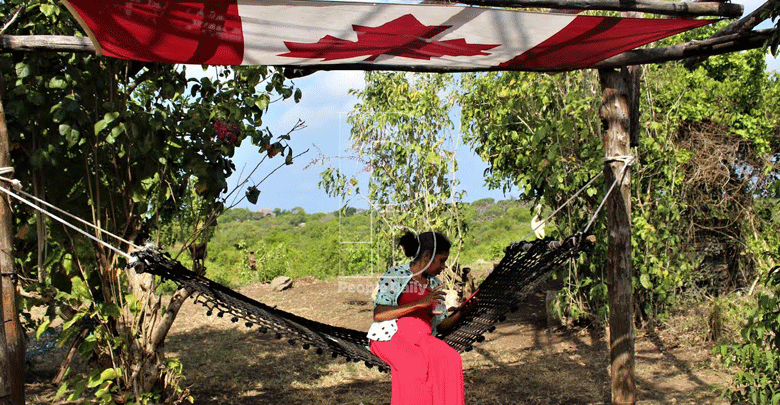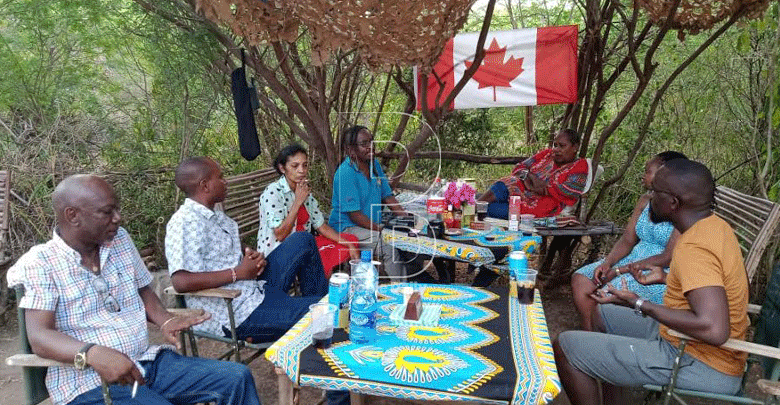Daytime treat in the bush with hippos

Tucked inside the remote village of Magarini in Malindi county, Camp Gedeng’ is a beautiful site for hippos, flamingos and other exotic birds. It was founded by a Kenyan film-maker who took part in the making of the 2020 Italian film Tolo Tolo shot in the location.
Jasmine Atieno @sparkleMine
Camp Gedeng! The first question on your mind when you learn about this getaway destination would be…what does Gedeng mean? Turns out, it is a word coined as an exclamation.
The name was born when the owner of the camp and his team of film makers first visited the site.
“We had come here to shoot the movie, Tolo Tolo, an Italian musical comedy and we made hippopotamus watching a hobby.
So, on this particular day, we were following a hippo that had been injured and as it came in site, we simultaneously exclaimed ‘gedeng!’” recounts Camp Gedeng chairperson Dominic Kiplagat Kene about how the camp’s name came to be.
Kiplagat, who is an actor and producer says the location of the camp, along the Lamu-Malindi road at Magarini, and about 10 minutes drive from Malindi and at the end of Sabaki River, is the exact place where the popular movie Tolo Tolo , which placed Kenya on the global map was shot in 2019.
“During the shoot, we took many videos of hippos at the Sabaki River. Later while reviewing the footage, we noticed a hippo with a rope tied around its neck.
We knew it was definitely in trouble, so we decided to follow it the following day to see if we could help free it. 
The next day, we found the animal at the river, and it turned out that the rope was actually a wire snare trap, and it had cut deep into the animal’s neck.
There is too much human-animal conflict in the area so it turned out this was just an unlucky day for the animal, we got the Kenya Wildlife Service officers who put the animal to sleep to save it from the misery,” he shares.
The team set up the camp at the location to protect the endangered hippos in March 2019, and two months later, Dominic bought the property and invested in a tourist and conservation site from the returns he had gotten from the movie.
“We came up with the idea to open up the place for tourists both local and international. I invested about Sh600,000 to buy the piece of land and transformed it into the beautiful place it is now,” he says smiling.
Being along the Sabaki River gives tourists a unique view of both hippos and flamingos and many other exotic birds, which travel from as far as Austria and Madagascar.
The camp has mini chilling camps for group guests marked with flags of different countries around the world and a cooking area.
The kitchen area has a traditional three-stoned cooking place, a jiko oven, wooden tables and plastic plates, for serving and a passionate chef.
We were served with fries, grilled chicken and some vegetable sauce.
As perfect as the place is, the camp closes down at exactly at 6pm for safety reasons. 
“There are about 70 hippos living in the river at the moment. Around 6pm is our curfew time, because the hippos are out of the water by night.
Hippos are very territorial animals and they mark their territories by flagging poop on the branches of the trees here.
These marked territories are not only laid out to warn other alpha hippos, but also for human beings, so if they find you on their spot, it will be a war, which might end in someone’s death,” he spells out, an explanation which totally makes sense to us, because, well, who wants to find strangers in their home at the end of the day?
We are advised to run to the nearest tree in case a hippo charges at us. That caution alone is good enough to set us quickly on our feet and on the road back home.
If you are looking for a daytime getaway, Camp Gedeng is an absolute treasure. The whole conservancy tour, including lunch will cost you Sh1,100 per person.
While the reception has been excellent for the business, Kiplagat shares that the only challenge is the local herders who still want their animals to graze within the camp.



